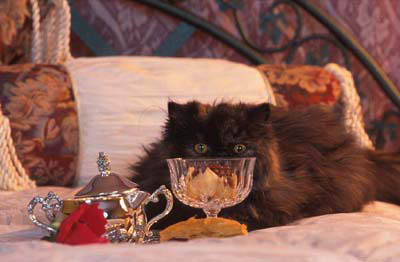
It's an alien conspiracy!
Posted on 06/14/2006 9:15:30 PM PDT by Serb5150
BELLINGHAM, Wash. – Margie Scott was devastated when her 9-year-old cat Sammy was diagnosed with kidney failure, but she never could have predicted what would give her comfort during her pet’s last days.
Scott, who lives in an apartment just south of Lake Whatcom, had adopted the long-haired white and gray cat when he was just six months old.
Last month, Sammy stopped eating his dry food and would sit in a corner for hours. Scott took him to the vet, who treated him for dehydration. But it wasn’t enough.
“He was better for awhile, but then he started going downhill,” she said. “He just had this haunted look in his eyes.”
Because Sammy was declawed, he was strictly an indoor cat. But he always wanted to go outside. So, in his dying days, Scott decided to let Sammy spend some time outside each day. Sammy enjoyed his time outside the apartment, which is surrounded by woods and wetlands.
A family of deer regularly visits the complex, and one day, Sammy was sitting outside in the grass when two young deer happened by.
Scott watched in astonishment at what occurred next.
“One walked up to Sammy and they touched noses,” she said. “The deer jumped back and made a sort of a snorting noise, like he was sneezing. It seemed like he was taken by surprise,” she said.
What she saw next was even more surprising.
”The deer started licking him all around the head and neck, and Sammy just sat there allowing the deer to do this,” said Scott.
For several minutes, the young deer licked the small cat. Scott grabbed her camera and got a picture of the tender scene.
“It was amazing,” she said. “I truly believe the deer was able to sense that there was something wrong with Sammy and that was why he started licking him, like he was trying to nurture him.”
Two days later, Sammy died.
Though Scott is still grieving the loss of her cherished pet, she takes comfort in the photo she has of Sammy and the deer.
“I have some amazing memories, including this one,” she said.
If you do get a chance to post the picture, I would love to see it!


"I want my bath!"

****
LOL.... I'm glad you're letting the kitty out. I may be nuts, but to me people who never let a cat outside better have a damn good number of reasons........ and there aren't very many!
not a question of salt
"..people who never let a cat outside better have a damn good number of reasons........ and there aren't very many!"
Feline leukemia, feline AIDS, ringworm, coyotes, cat-hating dogs, alligators -- need I go on?
It's not about how many reasons there are -- or whether or not you approve of them -- it's about the health and safety of our cats. If you have a problem with that, I suggest you take it up with a vet.
What a special story! It's truly dear that Sammy had such neat pals at the end of her life.
We once had a wonderful cat boy named Edgar that went into renal failure. It was a brutal, heartbreaking thing to watch. He was valiant and brave and fought it like a son-of-a-gun. Along with the efforts of a super vet, that is. But ultimately, Edgar let me know it was time for him to go.
Though all cats are memorable, Edgar will always hold an especially dear place in my heart.
ping
That's really sweet.
No....... don't go on. It's mostly all baloney.
These declawed cats here were indoors in the city of Pittsburgh for five years previously. I gave them absolutely no vet care when they got here ....... I gave them only THE WORD ...... I said, "stay healthy, eat the grasses out in the yard....... and don't get in a fight with a raccoon."
So far so good. Vets are great folks, don't get me wrong .......... but most of all that medical stuff is fear related baloney, and cats usually get ill because they are not fed and loved correctly. (jmo)
Crushed cantaloupe, olive oil, carrot babyfood in tuna, and a few other little secrets have kept all our cats vet free for generally over 20 years each. Our last five kitties died well into their 20's.
Really!
Talk to them...... and rub their spine in a meaningful way. And for the ones who have excessively thick coats...... give them a little piece of butter every other day or so.
It's very easy............... it's mostly ALL VIBES!
Proponents of the outdoor lifestyle believe it is better for Kitty to enjoy life to the fullest, even if her life is shortened by the consequences of outdoor living. An outdoor cat lives a more stressful life than an indoor cat, and stress leads to a myriad of physical and psychological disorders. Outdoor cats on the street, or even in the country, are faced every day with territorial disputes, threats from other animals, people, cars, environmental noises which cause panic, and situations which generate pure fear. Indoor cats generally live longer and healthier lives than outdoor cats - a fact that cannot be disputed.
Concerns With the urbanization of American life it has become the practice of the majority of cat people to protect their cats by keeping them safely indoors. And thanks to its wonderful adaptability, the cat can live happily, safely and healthy indoors. All but a small percentage of us-in the United States, at least-live in cities or towns. Domestic cats live where we are. So, realistically, the time is gone when we can debate about where cats should live. The cats are here, now, and we are responsible for them. It is a myth that cats easily return to a wild existence and are able to care for themselves. Domestication has suppressed or even silenced many of the feral skills necessary for survival. In fact, the typical outdoor cat's life span is generally shorter than that of exclusively indoor cats, or cats with access to protected outdoor areas. Quite simply, free-roaming life on the outside poses much greater risks for lethal disease and injury.
Cats love warm places to snooze, and many outdoor cats are attracted to a perch beneath the hood of a car. The poor cat caught by the fan or belt when the engine starts is permanently crippled, if not killed. Even savvy cats get into trouble. It takes only one mistake. A cat can easily be distracted by kittly delights (e.g., butterflies, birds) and dash across the street. Kitty can accidentally hitchhike in a strange vehicle and find herself far from home. Curious cats become trapped in outbuildings where their cries cannot be heard, or they fall into swimming pools and drown, or injured or killed at construction sites where a plethora of intriguing scents exists - including those of toxins and poisons. Outdoor Enemies It only takes a second for a kitten to escape from your house or the yard. The outside world is full of kitty dangers, from chemicals to cars to intolerant neighbors. But the number-one killer and crippler of outdoor cats is car accidents. Even usually attentive cats lose their concentration and dash into oncoming traffic when being chased by a dog, pursuing prey, or distracted by other kitty delights. "Free-ranging cats in the United States have an average lifespan in the general population of only 3 to 5 years; indoor cats have an average lifespan of 12 years and frequently live longer than 20 years. Car accidents are the biggest killers of free-ranging cats" The free-roaming cat is a magnet for parasites like fleas, ticks, mosquitoes and other buggy freeloaders, are deposited in your yard and house when Kitty comes home. Found in grass, soil, rodents and other kitty hors d'oeuvres, parasites often transmit or cause dangerous disorders like tapeworms, anemia, fungal, and heartworm disease. Cats can be poisoned simply by grooming themselves after walking across treated lawns. And should Kitty manage to catch that mouse, she may ingest poison the rodent has already eaten. Many parts of the country harbor dangerous predators like coyotes, eagles, alligators and great horned owls, who consider your kitten a tasty snack. Neighborhood dogs may not look kindly upon the free-roaming cat: not every kitty makes it up a tree unscathed. Cats who trespass in other yards and dig in gardens fuel the ire of otherwise tolerant neighbors. Some unenlightened humans actually dislike cats, while others protest kitty paw prints on their clean cars. Bird watchers become particularly irate if a neighbor cat stakes out their feeder. Some people may be tempted to retaliate.
Fights with other outdoor cats lead to dangerous bite and scratch wounds that can easily become infected. Even worse, fatal viral diseases like rabies and feline leukemia, feline AIDS, and FIP are spread by contact with infected animals. Remember, vaccinations cannot provide 100 percent protection, and reducing exposure is an important part of prevention.
http://maxshouse.com/outdoor_risks.htm
Too cute for words!
I'll stop right there. An indoor cat may not be stressed but it just may be bored to a silent death.
No............. forget about it.
Cats can adapt to mostly anything, they can amuse themselves with mostly anything.
I would NEVER keep a cat indoors.
NEVER!
FWIW - I am NOT the one that declawed her, that was the work of her previous owners. Who then dumped her at the animal shelter. Some people...
This is so touching.
Rather, the cruelty lies in exposing them to the dangers outside of a safe home." --- Total Bull.
This guy is certifiable.
I think declawing cats is stone-*ss EVIL!
I got these two declawed cats from some gay goon (not that there's anything wrong with it) who was dismayed and terribly PUT OUT that the cats scratched his sofa and rugs. What an incredible *sshole!
The cats (females) are fine out here on out four acres of wooded land. They hang around with the deer, they graze in the long grasses in the back, and they climb trees. And, they have become grat mousers. I'm 60, have had around 20 cats in my life, and I talk to them. I tell them what to do. That may sound odd.......... I don't care. Health is mostly all in your head......... and theirs.
Thanks for taking care of your declawed kitty.
My cats live a lavish, happy life thinking they're humans, some have lived over 20 years. My nextdoor neighbor lets her cats out. They live 2 to 3 years.
You really don't know cats.

Disclaimer: Opinions posted on Free Republic are those of the individual posters and do not necessarily represent the opinion of Free Republic or its management. All materials posted herein are protected by copyright law and the exemption for fair use of copyrighted works.